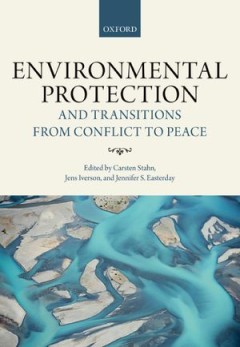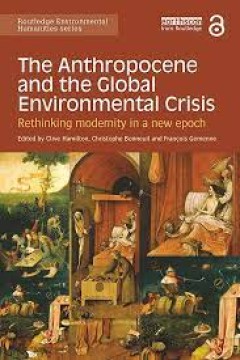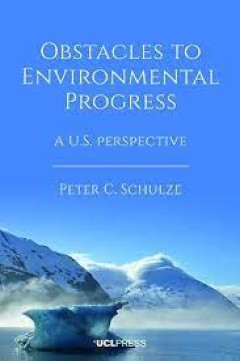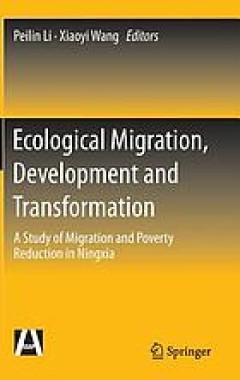Filter by

A comparative history of social responses to climate change, ozone depletion,…
This long-awaited two-volume book examines how the interplay of ideas and actions applied to environmental problems has laid the foundations for global environmental management. It looks at how ideas, interests, and institutions affect management practice; how management capabilities in other areas affect the ability to deal with specific environmental issues; and how learning affects society's…
- Edition
- -
- ISBN/ISSN
- 9780262284011
- Collation
- 1 online resource (xxv, 376 pages) :illustrations.
- Series Title
- -
- Call Number
- -

Reflections on water :new approaches to transboundary conflicts and cooperation
This book offers conceptual and empirical support for the idea that the human relationship with water must move beyond rationalist definitions of water as product, property, and commodity.OCLC-licensed vendor bibliographic record.
- Edition
- -
- ISBN/ISSN
- 9780262268660
- Collation
- 1 online resource (xvi, 358 pages) :illustrations, maps.
- Series Title
- -
- Call Number
- -

State making and environmental cooperation :linking domestic and internationa…
The Amu Darya and Syr Darya rivers of Central Asia flow across deserts to empty into the Aral Sea. Under Soviet rule, so much water was diverted from the rivers for agricultural purposes that salinity levels rapidly rose and the sea shrank. There was an upsurge in dust storms containing toxic salt residue, and a new desert began to replace the sea. At the same time, agricultural runoff rendered…
- Edition
- -
- ISBN/ISSN
- 9780262285919
- Collation
- 1 online resource (ix, 274 pages) :map.
- Series Title
- -
- Call Number
- -

The state and the global ecological crisis
Countering the current view of many environmental activists that sovereign nations cannot provide effective environmental governance, The State and the Global Ecological Crisis offers analyses and case studies that explore the prospects for "reinstating the state" as a facilitator of progressive environmental change rather than a contributor to environmental destruction. The authors recognize t…
- Edition
- -
- ISBN/ISSN
- 9780262267830
- Collation
- 1 online resource (xxv, 307 pages)
- Series Title
- -
- Call Number
- -

Smokestack diplomacy :cooperation and conflict in East-West environmental pol…
Many environmental problems cross national boundaries and can be addressed only through international cooperation. In this book Robert Darst examines transnational efforts to promote environmental protection in the USSR and in five of its successor states--Russia, Ukraine, and the Baltic republics of Estonia, Latvia, and Lithuania--from the late 1960s to the present. The core of the book is a c…
- Edition
- -
- ISBN/ISSN
- 9780262271196
- Collation
- 1 online resource (xii, 300 pages).
- Series Title
- -
- Call Number
- -

Surveying climate-relevant behavior : measurements, obstacles, and implications
This open access book discusses the contribution of sociology and survey research to climate research. The authors address the questions of which behaviors are of climate relevance, who is engaging in these behaviors, in which contexts do these behaviors occur, and which individual perceptions and values are related to them. Utilizing survey research, the book focuses on the measurement of clim…
- Edition
- -
- ISBN/ISSN
- 9783030857967
- Collation
- xi, 159p. : ill.
- Series Title
- -
- Call Number
- 363.73874

Environmental Protection and Transitions from Conflict to Peace
This book is the first targeted work in the legal literature that investigates environmental challenges in the aftermath of conflict. The volume brings together academics, policy-makers, and practitioners from different disciplines to clarify policies and practices of environmental protection and key legal considerations related to normative frameworks (e.g. international environmental law, int…
- Edition
- -
- ISBN/ISSN
- 9780198784630
- Collation
- -
- Series Title
- -
- Call Number
- 300 ENV

The Anthropocene and the Global Environmental Crisis Rethinking modernity in…
The Anthropocene, in which humankind has become a geological force, is a major scientific proposal; but it also means that the conceptions of the natural and social worlds on which sociology, political science, history, law, economics and philosophy rest are called into question. The Anthropocene and the Global Environmental Crisis captures some of the radical new thinking prompted by the arriv…
- Edition
- -
- ISBN/ISSN
- 9781317589099
- Collation
- -
- Series Title
- -
- Call Number
- -

Obstacles to Environmental Progress A U.S. perspective
environment;policy;biology;earth sciences;United States;obstacles to progress;environmental policy;environmental law;environmental regulation;environmental science;environmental progress;environmental solutions;environmental justice;sustainability;uncertainty;decision processes;climate change;problem solving;unintended consequences;systems perspective;environmental monitoring;freedom and enviro…
- Edition
- -
- ISBN/ISSN
- 9781800082076
- Collation
- -
- Series Title
- -
- Call Number
- -

Ecological migration, development and transformation : a study of migration a…
After over 30 years of reform and opening up, China's aggregate economic volume is now the second largest in the world. Over the past decade many provinces in the western region of China have implemented ecological migration projects of different scales, which have attracted considerable attention both in China and abroad. The projects indicate, first, that there is an urgent need for this type…
- Edition
- -
- ISBN/ISSN
- 9783662473658
- Collation
- xiii, 212 pages : illustrations ; 24 cm
- Series Title
- -
- Call Number
- 363.7
 Computer Science, Information & General Works
Computer Science, Information & General Works  Philosophy & Psychology
Philosophy & Psychology  Religion
Religion  Social Sciences
Social Sciences  Language
Language  Pure Science
Pure Science  Applied Sciences
Applied Sciences  Art & Recreation
Art & Recreation  Literature
Literature  History & Geography
History & Geography